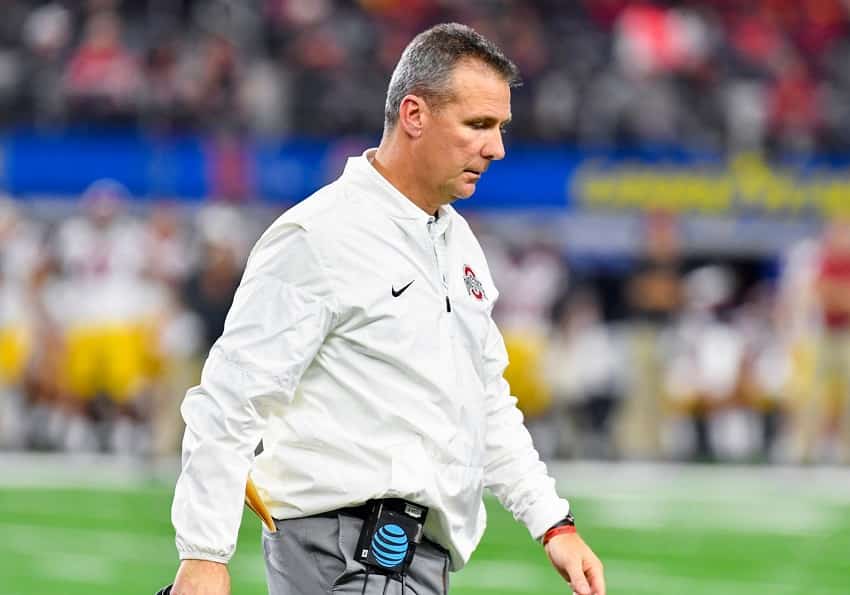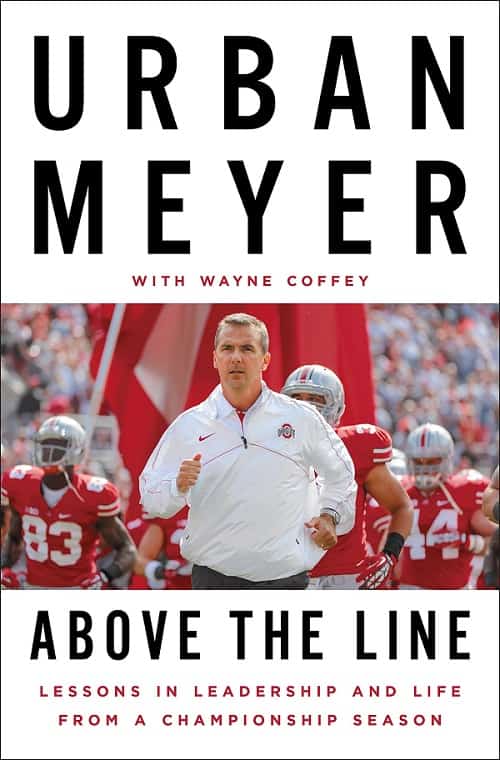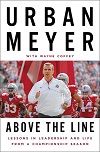
Urban Meyer is one of the winningest college football coaches in recent history.
He won two national titles in Florida during the 2000s, and a third in 2014 at Ohio State. It’s the journey of that championship winning season with the Buckeyes that provides the backdrop for Meyer’s leadership philosophy, which he brilliantly distills in Above the Line: Lessons in Leadership and Life from a Championship Program.
Meyer’s leadership philosophy is anchored in an Above the Line or Below the Line classification system. Two different sets of behaviors that promote excellence or promote mediocrity. The book outlines how can you spend more time Above the Line, becoming a relentless leaders and performer.
While many leadership books—especially from coaches—tend to be full of platitudes and slogans, Meyer’s book actually provides a decent template and system that develops outstanding leadership and performance.
High-performers understand that consistent excellence can only be found with a good system and process, and Meyer is generous with describing his system and how teams, organizations, and leaders can use it for their own performance.
Meyer includes examples from his coaching career as well as the 2014 season, where they went to the national championship and beat Oregon. He details the power of belief, the importance of having systems to build leadership, and much, much more.
Meyer’s book is essential reading for coaches and leaders. The lessons, strategies, and wisdom are applicable far beyond the football field.
Here are just some of the leadership lessons that I got from Above the Line, including key quotes, passages, and a selection of my own notes and thoughts.

Where to Buy — Above the Line by Urban Meyer
Paperback | Audiobook | Kindle
Excellent leadership isn’t an accident. It’s a system.
Instead of hoping for good leadership, Meyer’s Above the Line system makes leadership a process. Something that is on purpose and can be relied upon under pressure.
- “Average leaders have quotes. Good leaders have a plan. Exceptional leaders have a system.”
Address your failures. They are catalysts for improvement.
When we experience failure, whether it’s getting blown out at a Bowl game or having a stretch of lousy workouts, it can be difficult to find lessons in how to proceed.
But it’s specifically in the aftermath of setbacks and failures that a clearer path forward can be found.
Failure is often the fertilizer for tomorrow’s success, if we have the strength and courage to look inside and ask hard questions.
- “It was the most productive pain I ever could have experienced. It forced me to reevaluate every aspect of what we were doing and to be brutally honest with myself. That kind of honesty, whether it’s a hard look at yourself or your team, is not easy.”
- “If you don’t identify and expose the issue, you are never going to be able to solve it. If you try to ignore a problem, or run from it… it is only going to get worse.”
- “Run toward problems. If you ignore them, they only get worse.”
Leadership drives results
Often team leaders get lost in the mechanics of a performance instead of looking at the leadership of the team. The mechanics and results get better when leadership improves, not the other way around.
- “I’ve come to learn that your football system gets better when your leadership system gets better.”
- “Leadership isn’t a difference maker, it is the difference maker. Talent will get you about seven or eight wins. Discipline pushes it to nine wins, maybe. But when you add leadership, that’s when magic happens.”
Above the Line is a philosophy for life, not just the football field
Meyer’s system of Above the Line vs. Below the Line isn’t just about being successful on the football field, in the gym, or for game day.
It’s a philosophy for more intentional and purposeful living, extending far beyond the podium and the scoreboard. It touches everything you do in life, not just what you do on the football field.
- “Above the Line behavior is the foundation of success in anything you do. There isn’t an aspect that is untouched by it, and because of that, the decision to behave Above the Line or Below the Line is the most important choice you make every day.”
Set the standard
- “If you want people on your team to perform Above the Line, then you must lead Above the Line.”
- “A leader is someone who earns trust, sets a clear standard, and then equips and inspires people to meet that standard.”
- “If you want the people on your team to perform Above the Line, then you must lead Above the Line.”
- “The performance of the players in your unit is a reflection of the culture you create.”
- “Your team, business, or organization will perform to the level of leadership you provide.”
How you respond (the R Factor) is what matters
Adversity strikes us all and usually when we expect it least.
You get injured in the lead-up to the biggest game of the season. An opponent comes out more aggressively than expected.
Champions respond productively to what happens to them, whether good or bad.
Injured your shoulder? Work your legs and build a bigger motor than ever. Competitor crush you in the first quarter? Reset your mindset and focus on executing in the second.
The chasm between victory and defeat is found in what Meyer calls the R Factor, the way you respond to any given situation.
- “We don’t control the events in life, and we don’t directly control the outcomes. But we always have control over how we choose to respond. How we respond means everything. We call it the R Factor.”
- “Nobody wants hardship or adversity, but everybody gets it. It’s inevitable. No one escapes pain, fear, or difficulty… a successful life involves some amount of necessary pain. When it happens, don’t run from it. Learn from it.”
Press pause
Meyer instructs his players to his pause mentally when the unexpected happens. The pause can be a fraction of a moment or a week, depending on the event.
Doing so gets players off less productive mental habits and gives them a chance to respond intentionally instead of according to impulse.
- “Pressing pause gives you time to think. It gets you off autopilot and helps you gain clarity about the outcome you are pursuing, the situation you are experiencing, and the Above the Line action you need to achieve the outcome.”
Take ownership of your self-talk
The language you use with yourself (“I suck! I’m no good at this!”) has a direct effect on your behaviors and actions. Meyer instructs his players to replace negative self-talk with self-talk that keeps them focused on Above the Line behaviors.
- “We teach our players to replace low-performance self-talk with high-performance self-talk. We tell our players, ‘The voice in your mind is a powerful force. Take ownership of that force.’
Train at a high-level
In competition, and under pressure, players rarely suddenly rise to the occasion or develop a clutch gene. Rather, they sink to the level of their preparation and training.
Competing at a high level means training at a high level; bringing competitive intensity, experiencing adversity and challenging scenarios in practice, so that in competition we rise to a higher level.
- “Under pressure, we do not rise to the occasion. We rise or fall to the level of our training. When contact is made, it is too late to train and build skill. We must prepare and develop our R Factor capacity before we experience challenging situations.”
Progress towards excellence
Getting better isn’t really a mystery. Do things a little bit better each day and load up on the reps so that high-performance becomes the default. Bank reps of excellence.
- “You reach a new level—an elite level—by continually pushing yourself through specifically designed repetitions, and doing it with uncommon dedication.”
Be simple and clear about the culture
Leaders should always seek to make culture and expectations simple and clear. If you need a twenty page outline to explain the culture you want from the team, it’s likely that you still aren’t that clear on the culture.
Clarity and purpose come from simplicity.
Pete Carroll’s coaching philosophy, detailed in his book Win Forever, included simple, clear rules, like “protect the team.” Bill Walsh’s Standard of Performance, broken down in his essential leadership book, The Score Takes Care of Itself, was clear-cut and had expectations from the receptionist at the team building to the biggest stars on the team.
- “Your culture message must be exceptionally clear: no confusion, no uncertainty, no excuses. Explain to your team that this is what we believe and how we behave in all circumstances. It is who we are.”
- “In the winter of 2014, we created a blueprint to communicate our culture to everyone on the team. The goal was to be so clear about our culture that there would be no confusion, no uncertainty, and no excuses.”
- “We communicated the culture blueprint with exceptional clarity and nonstop consistency to our team. And held everyone accountable to it.”
Be intentional about your culture
- “You don’t get the culture you want; you get the culture you build.”
- “Every organization has a culture either by design or by default.”
Culture is the permanent fix for behaviors
It is tempting to play whack-a-mole with behaviors that are counter-productive. Players showing up late. Complaining when things get tough in practice. Cracking under pressure.
But a clear-cut culture helps blanket a majority of them before they happen. By setting clear expectations and holding everyone accountable there is less wiggle room, and players are more likely to hold each other accountable.
- “If you attack behavior without building the culture, the behavior may change temporarily, but it will eventually (probably quickly) revert.”
- “Make your cultural standards clear, hold people accountable to those standards, and the results will follow.”
- “A great culture can make even a mediocre strategy successful, but a weak culture will undermine even the best strategy.”
Accountability means evaluating performance
How can you know if you are doing a good job if there aren’t benchmarks and measurements to grade your effort?
Have standards that are measurable so you can promote accountability in your performance. Things like attendance and effort are two obvious measurables that athletes should strive to focus on to keep themselves engaged and accountable to themselves and the team.
- “We grade our players on every measure of performance possible at Ohio State. We grade their performances in games, practices, weight room, conditioning, nutrition, rehab, and especially, in the classroom and tutor sessions. Each Thursday, every player gets a score on a scale of 1 to 10 to determine his accountability in each area.”
Culture drives results
The score and the results are what get all the attention. It’s natural to focus exclusively on them at the risk of allowing culture to slide by the wayside. Don’t get so blinded by the score that you bypass the thing that drives the results to begin with.
- “Yes, results are important. We’re all in this to produce results. But again, culture is what sustains the behavior that gets you those results. Build the culture. The results will come.”
- “Winning behavior will not thrive in a culture that does not support it.”
Effort, effort, effort
You can have all the talent in the world, a bulletproof set of plays and schemes, and the best equipment money can buy, but ultimately, it’s effort that is the difference maker.
- “Either you worked harder than your opponents or you got outworked. The challenge is to build a culture—a competitive environment—where everyone gives relentless effort every day. A culture everyone wants but few get.”
- “I’ve never been in a football game where the team that played the hardest didn’t win.”
Champions are forged in the grind
There’s no outsmarting effort. Either you are forging iron with iron in practice, or you aren’t.
Ohio State purposely makes their practices to the point of soul-breaking in order to steel players for the pressure and spotlight of high-stakes games.
- “Our guys fully accept the challenge of effort and toughness in our workouts and practice. They understand that the ability to compete and win is forged in the crucible of training. It is forged in the grind.”
Effort outpaces talent in the long run. You can only rely on talent so much on game day. It’s effort that is the foundation of your performance from kickoff to the final whistle. After all, what good is talent without toughness?
- “We believe that being elite is not about how talented you are. It is about how tough you are. To achieve anything great in life, you have to fight for it.”
- “Here’s the not-so-hidden secret for achieving success: clarify what you really want, then work as hard as you can for as long as it takes. Toughness can achieve things that talent by itself can never accomplish.”
Players will often assume that they can only be mentally tough in competition or on game day. That the grit and fortitude they need to succeed in pressure situations will magically be summoned when they need it most. But Meyer recognizes that being mentally tough starts long before warm-ups. It starts between the ears before practice.
- “First you win the battle in your mind. Next you win the battle in practice. Then (and only then) you win the battle in the game.”
 Where to Buy — Above the Line by Urban Meyer
Where to Buy — Above the Line by Urban Meyer
Paperback | Audiobook | Kindle
Looking for more leadership books for coaches? Here are some more of my favorites.